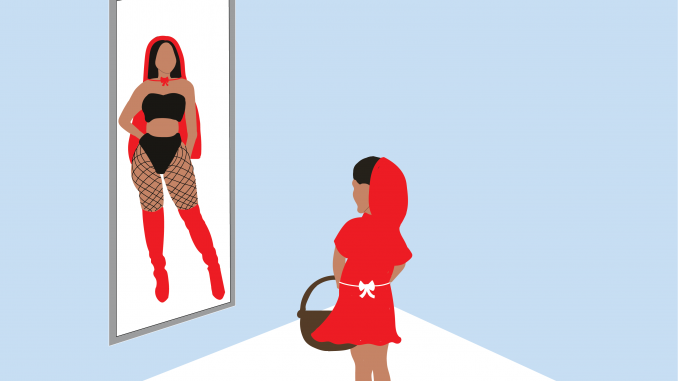
Although Halloween is often viewed as a fun, harmless holiday, some students and a professor believe that hypersexualized costumes can negatively affect young girls’ self-image.
When the choice to dress provocatively becomes an expectation, younger girls may believe there is only one way to be seen as desirable, said Rajuta Chincholkar-Mandelia, an assistant professor of gender, sexuality and women’s studies.
“Sexy” costumes leave girls with only a singular option with how to dress, and they are no longer choosing what to wear, but instead going along with what society tells them to do, Chincholkar-Mandelia added.
“For older women it is more subjective for how they want to dress,” Chincholkar-Mandelia said. “But when it comes to children, I think it can be really damaging … they are sexualized in certain ways that are unacceptable.”
Stephanie Miodus, a school psychology Ph.D. student in the College of Education, focuses her research on children. She said that through her studies and personal experience, she believes the sexulization of young girls leads to the desire to meet beauty standards.
“At an age ripe with comparison, they may also feel the added pressure of how they dress on Halloween measuring up to some standard set by others instead of enjoying the spooky and fun aspects of the holiday,” she said.
Women should make an autonomous choice for their Halloween costumes, Miodus said. The issue is sometimes young girls are then objectified for how they are dressed.
“As girls transition to adulthood, it is important that they are given some independence to express themselves including through how they dress, but that does not mean that anyone who is not yet an adult should ever be in a costume that is specifically labeled as sexy,” she added.
Ben Wilcox, a freshman communication and social influence major, said although dressing sexy can be empowering to women, when it becomes an expectation, it can be harmful.
“It was decided that Halloween can be an opportunity to gawk at pretty women in their sexy Halloween costumes, but then it became something that girls actively wanted to do,” Wilcox said.
Molly Mays, a freshman business management major, said that although women should be able to choose how to dress, they shouldn’t feel pressured to present themselves in a certain way.
“A woman should be OK to wear whatever she wants, but we talked about the sexualization of children in class and I do not think kids dressing sexy will help empower them,” Mays said.
Showing skin is not a problem, but it should not be used as the only way for women to feel confident, Mays added.
“Their clothes should not determine if they like themselves,” she said.
Wilcox said that regardless of the nature of the costume, young girls should not be perceived as sexual.
“Once somebody is old enough to legally speaking, act on their own, is when that should be judged,” he added.
Fifty-three percent of 13-year-old girls are dissatisfied with their bodies and this grows to 78 percent by the age of 17, according to a 2014 study on body image by the Park Nicollet Melrose Center, an eating disorder treatment center in Minnesota.
There needs to be more dialogue about the subject to help women make a natural decision rather than succumbing to social norms, Chincholkar-Mandelia said.
“Conversations and ideas are really important to create change because once you start that conversation you begin to have your own internal thinking,” she added.



Be the first to comment